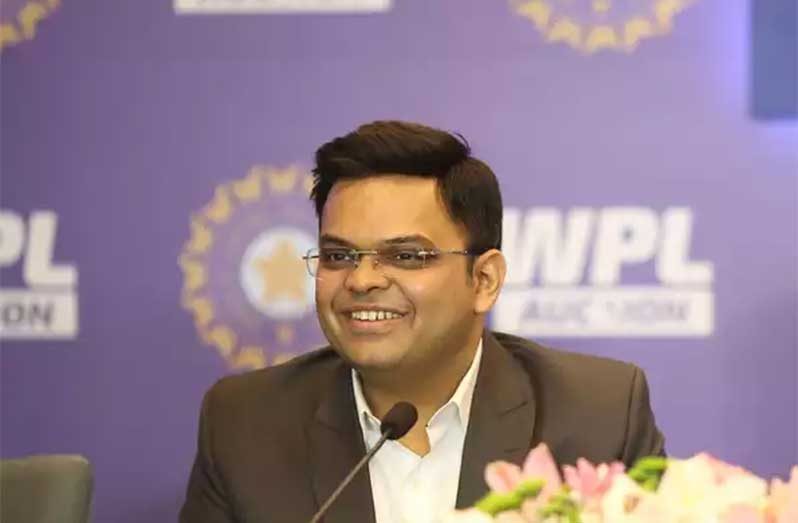WITH no Independent Woman Director appointed yet, the International Cricket Council (ICC) board currently consists of 16 members. To get elected to the Chair, a candidate is required to secure nine votes, a simple majority.
The election process is preceded by a nomination phase, where each candidate requires a proposer and a seconder. Jay Shah, who was elected as Chairman on Tuesday, received backing from 15 out of the 16 current directors in the nomination stage.
Who is the 16th director is inconsequential, and there was no need for an election. Among those backing him were directors from Australia, England and New Zealand.
Never before has the ICC board been so strongly united in its support for a single director. Over the years, India has exported several leaders to the ICC, including Jagmohan Dalmiya, Sharad Pawar, N Srinivasan, and Shashank Manohar, and none of them could claim the unanimous and overwhelming backing of the ICC members.
Dalmiya (in 1997) had to rely on the votes of Associate nations and the Asian bloc to fend off challenges from the England-Australia-New Zealand-West Indies group in a vertically split ICC. When Pawar ascended the position in 2010, Australia and New Zealand were pushing for John Howard, the former Prime Minister of Australia. Srinivasan (2014) managed to win over England and Australia, but many other boards were not fully aligned with him. He was, after all, one of the architects of the highly controversial Big Three arrangement. Manohar (2017), who dismantled the Big Three system, garnered global support, but questions remained about whether he had the full backing of the BCCI at all.
At just 35, Shah becomes the youngest administrator to lead the world governing body with unanimous support. It is remarkable that in a very short time, he managed to gain so much trust from its members. “Just as he has done for Indian cricket, both men and women, players worldwide will benefit,” Sunil Gavaskar wrote in a recent column in Sportstar.
Shah’s single most contribution to world cricket to date has been ensuring cricket’s entry into the Olympics – a feat that may well be his most lasting legacy. Historically, the BCCI leaders resisted joining the Olympic fold, fearing it would compromise their autonomy at the national level, particularly vis-a-vis the Indian Olympic Association (IOA). Shah’s perspective transcended such concerns, focusing instead on the larger interest of the sport. Without the BCCI’s backing, an Olympic berth for cricket would not have been possible, and Shah saw the importance of taking the game to the Olympic Games.
At the BCCI level, few can match his achievements as the secretary. From establishing a state-of-the-art high-performance centre in Bengaluru to creating a distinct identity for women’s cricket and advocating for the primacy of Test cricket, the list of his achievements have been plenty. The best part of his five-year tenure in the BCCI, since taking over as its secretary in 2019, has been that he has consistently placed his priorities in the right areas.
One of Shah’s biggest achievements was navigating the challenging Covid period in 2020 and 2021, when much of the world had come to a standstill. But cricket in India did not. He successfully managed several international home series and, most notably, two seasons of the IPL in a strict bio-secure bubble. While his father Amit Shah’s position (the Union Home Minster) in the Central Government may have helped, the fact remained that cricket continued to thrive in India, even in the most difficult times. Crucially, he ensured that the 2021 T20 World Cup was held in the UAE, with the BCCI retaining the hosting rights. Last year, he delivered the most successful World Cup ever.
A landmark decision in Shah’s tenure was the launch of the Women’s Premier League (WPL), ensuring that both the franchises and media rights were not undervalued or undersold. The league’s teams were cumulatively sold for an impressive Rs 4,669 crore, while the media rights added Rs 951 crore, numbers hitherto unthinkable in women’s cricket.
This came on top of the Rs 48,390 crore for the IPL media rights, an eye-popping and jaw-dropping valuation. The value of BCCI’s bilateral rights also saw a considerable uplift, with each international game fetching Rs 67.8 crore, bringing the overall four-year value to Rs 5,963 crore. These figures would have made even Lalit Modi proud.
Shah’s administrative journey began at the district and state levels in 2009, when he worked with the Central Board of Cricket, Ahmedabad (CBCA), and the Gujarat Cricket Association (GCA) as an executive. In 2013, he became the joint secretary of the GCA, where he played an instrumental role in raising the colossal Narendra Modi Stadium in Ahmedabad, the world’s largest cricket ground.
Taking over as the BCCI secretary in 2019, Shah also oversaw one of the finest phases in Indian cricket history, marked by success at international level, including the recent T20 World Cup triumph. Notably under his leadership, the BCCI – an organisation known for its factionalism otherwise – remained solidly united. Few cricket administrators in India, perhaps, can boast of such a track record. World cricket is sure to benefit from his drive to bring about improvements. (Cricbuzz)



.jpg)









